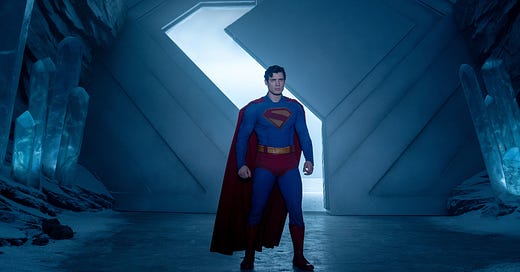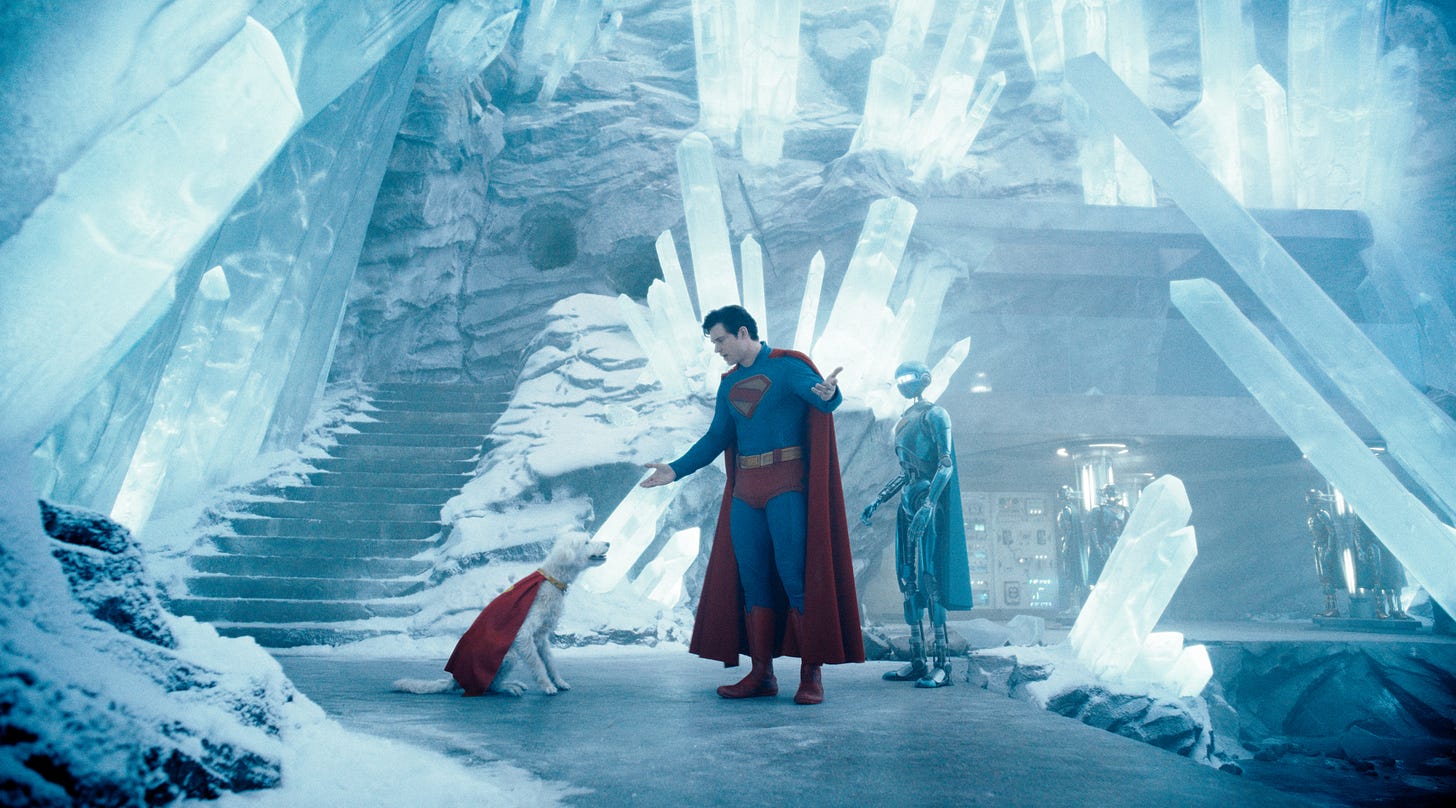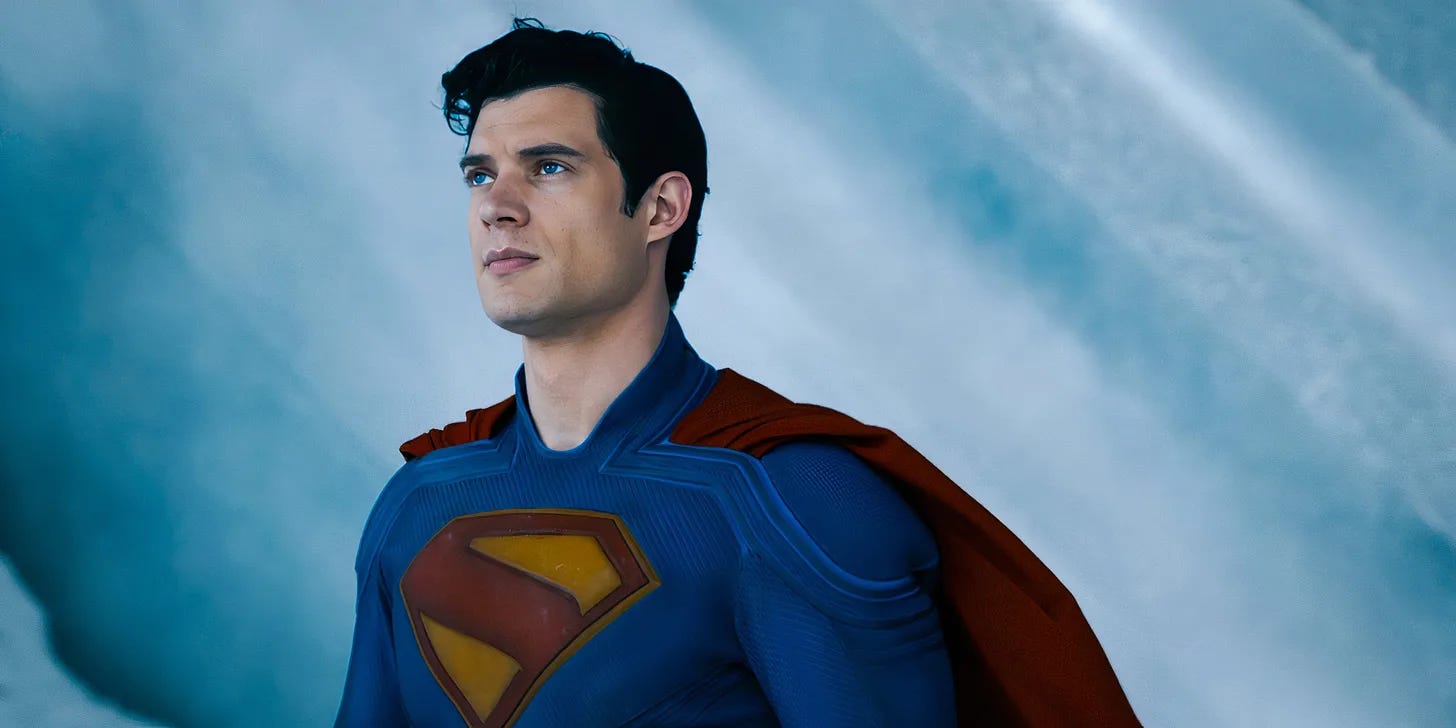While the ongoing superhero movie boom, though long crescendoed, has seen many-a-esoteric corners of the genre brought to life, despite his foundational impact, seeing Superman adapted, to frustration, has been far tricker.
Burdened, perhaps, with the weight of what came before. Waylaid, by misplaced expectation. Thrown off course by misinterpretation or by some accounting of all three.
Rather than being little more than nostalgia-driven entrapment à la Superman Returns, it was envisioned as DC’s answer to the bulwark that was the Marvel Cinematic Universe (MCU). Instead, wayward franchise starter, 2013’s Man of Steel nearly sunk the entire enterprise before it began. Director Zach Snyder and star Henry Cavill’s take on the character, even at its most visible, being dark, self-insistent and almost entirely joyless. Inverting the traditional image of Superman (if not without some source material precedent) but to noted, earned polarization amongst critics and the majority audience both.
And while the as-titled DCEU would experience undeniable bursts of success regardless, they were almost entirely siloed: removed from the shared universe concept that a revolving door of creatives, over fifteen films, were never able to truly get off the ground.
Perhaps then, in finally recognizing the folly of their misplaced ambition, brought aboard to reset and shepherd DC forward was writer-director James Gunn.
It tracks.
Gunn became a household name in superhero cinema with his MCU-based Guardians of the Galaxy trilogy before a since-resolved professional crisis (the resurfacing of offensive online posts) saw him recruited to the outfit across the hall. His 2021 effort, The Suicide Squad and later, spinoff TV series Peacemaker proving not just what he could do, to great strength, in the Detective Comics sandbox but that a steadier hand at the helm was what they needed most.
So named the co-head of DC Studios alongside his producing partner Peter Safran in 2022, Gunn has promised a character-and-story-first focus above all else, a baseline measure of care so often absent in DC’s post-Nolan world.
Though it is under this current-moment umbrella of corporate wrangling, so-proclaimed superhero wariness and inflammatory cultural discourse in which Superman, the first film in Gunn’s rebooted DC Universe arrives, upon its opening in theatres this past weekend.
While Snyder and Cavill’s most fervent supporters, forever emboldened (for worse, it seems) by their Justice League movement, continue their DOA crusade to get the duo reinstated (as, in contrast, Snyder and Gunn buddy it up on Rick and Morty), Gunn, in taking on the lead in the majority of the film’s marketing, as writer-director-studio head, has outlined his vision of a Superman far better aligned with the character historically: inherently good, truthful and driven to protect others simply because it is just (which has caused uproar by right-wing aligned morons, who seem destined to purposely misinterpret every piece of media they can, if only to fuel their own, self-started fires).
Yet while each of these preceding elements work to colour the frame in which Superman sits, ultimately, once the lights go down, the most pressing question is if the film itself can actually measure up to those nigh-outsized expectations.
And where it matters most, it very much does.
Soaring, not just singing.
The first outing in this summer’s larger-than-life double-bill (preceding Marvel’s Fantastic Four: First Steps by two weeks) Superman is another victory for quality-over-quantity in the superhero space.
Easily sitting next to the indomitable standing of the first two Christopher Reeve-led films by both bringing the character forward with a modern sensibility while simultaneously embracing its inherently bombastic, Silver Age/Grant Morrison-inspired trappings with an honesty that has become a genre rarity - even when it doesn’t always line up as well as it could.
For the past three years, Kal-El/Clark Kent (David Corenswet) has been operating as Superman, primarily in the city of Metropolis, becoming known the world over as a symbol of hope and justice.
Having mostly gotten a handle on the superhero racket, he has a had a harder time finding balance in his budding romantic relationship with Daily Planet co-worker, journalist Lois Lane (Rachel Brosnahan). She knows of his secret identity and does support him but isn’t afraid to push back on the socio-political/ethical implications of Clark’s heroism either, to his frustration: to do good, to save lives, it is his only priority.
Meanwhile, billionaire scientist Lex Luthor (Nicholas Hoult), who has become obsessed with Superman, schemes to defeat Krypton’s last son while advancing his own agenda, alongside his army of tech-minions, right-hand The Engineer (María Gabriela de Faría) and girlfriend, Eve Teschmacher (Sara Sampaio).
But as a political firestorm and new revelations about his past see him struggling, Clark, enlisting the help of his allies, the Justice Gang - Green Lantern/Guy Gardner (Nathan Fillion), Mister Terrific (Edi Gathegi) and Hawkgirl (Isabela Merced) - and his unruly dog Krypto, is reminded, in battling Luthor, that strength is not just calculated in brute force alone.
This then, the sheer breadth of the film’s immediate scope, it is, in equal measure, its biggest and messiest swing.
Spiritually following of the blueprint of another superhero outing, 2017’s Spider-Man: Homecoming, Superman purposefully sidesteps the origin story set-up, even if the exploration of Clark’s roots do play a key role in the narrative.
Instead, Gunn’s decision to drop the viewer into an already established universe, filled to the brim with characters and pre-existing backstories/dynamics is one that, while enriching, conversely, doesn’t find its footing right away. It is clear that Gunn, his editors or a combination of the two realized, at some point in post, that clarity was the operating word and they then scrambled then to align all those pieces on the board the best they could with what they had.
Clearly, the film is going for the feeling of starting a new run, with a new (if familiar) creative team at the helm: backstory is doled out as needed but it understood that the reader (or in this case, the viewer) can keep pace.
But it isn’t until the film settles in, around the twenty-five minute/half-hour mark, does this choice effectively translate, albeit, with a modicum of aftertaste.
Elsewhere, one of Superman’s more prominent storytelling twists is telegraphed far too early for anyone who has seen a Seinfeld rerun and despite its best efforts, it can’t escape a third-act dominated by a CGI-superhero slugfest, though it is softened somewhat by the character work surrounding it - more so once Jimmy Olsen (Skyler Gisondo) and the Kents (Pruitt Taylor Vince and Neva Howell) are given chances to stretch their legs in smaller but still impactful roles.
For all-in-all, Superman though, a Gunn film with cause, existing somewhere in-between Guardians and Suicide Squad stylistically - the needle drops, the returning, long-time collaborators, the humour, etc - is buoyed by its framework.
The action and staging by cinematographer Henry Braham is sharp, the costuming is deliberate but not overbearing and there is a clear attempt to focus on the campiness inescapable, though so often downplayed, within Superman and his supporting cast.
The imposing grandeur of the Fortress of Solitude or the inclusion of the Superman Robots. The bright red trunks, Krypto and the comic-accurate ridiculousness of Guy’s haircut. Each element feels genuine, essential even, to this specific version of the character, without pandering (at least too much) to the latent nostalgia present for any particular viewer in its comic or animated inspirations.
Though at the same time, Superman is not afraid to linger on the more pressing nor the more serious, either. Not in spite of itself but in service, as the performances help dictate.
Fillion doesn’t have too many notes to hit beyond Guy’s smarmy hero act but he plays them to a tee, as does Merced, who doesn’t have a wealth of material, comparatively but makes Hawkgirl feel lived-in all the same.
Of the Justice Gang then, it is Gathegi who has the most screen-time and he makes sure not a moment of it is wasted, as one of the film’s best. His Mister Terrific, dry humoured, quick-witted and seemingly indifferent to heroism as he is, proves there is more to him than the corporate-backed exterior he initially presents.
In support, Gisondo and Sampaio are memorable in what are essential but more comic-relief roles, while Vince and Howell’s quiet humanity proves itself as the true foundation that keeps Clark grounded.
Hoult’s Luthor, in contrast, is a different story.
And it isn’t as though he feels wholly miscast, per se, radiating a far more pressing sense of evil than any of his cinematic predecessors in the role. A grudge against Superman which has evolved into his life’s work, no matter the personal or professional cost. Yet it almost feels transparent, the real-world parallels to other emotionally-stunted tech titans (one, in particular) evident but not something Hoult nor Gunn seem totally comfortable tackling in full. Wanting to leverage the mad scientist angle instead (if to create a degree of separation between Jesse Eisenberg’s portrayal in Snyder’s films, most recently) but inconsistently so.
In making Luthor a more visible generational peer of Superman, within that characterization, Hoult never seems to find a proper rhythm. The erraticism, over collected genius, simply played out too quickly.
On the reverse, Brosnahan and Corenswet, as the film’s emotional bedrock, shine as Lois and Clark.
Right from the jump, Lois is played with great distinction.
She is level-headed but tremendously fiery, not once afraid to hold Clark to task for the occasional greyer morality of his actions, despite their net positive or admit to her own doubts regarding their still blooming romance.
But equally so, while a capable investigator geared to discern the truth from a professional standpoint, Lois is fearless either way, in her own heroic mold, for those she cares for.
In theory, lesser creatives may have taken the opportunity to relegate her but given equal spotlight, Brosnahan is a standout every time she appears on screen. Capturing the character’s individualism perfectly, though intrinsically as she is, tied to her co-star, in Corenswet.
And though they are battling against the best impressions of prior interpretations, Brosnahan and Corenswet’s Lois and Clark dynamic is distinct: despite their early-in-love status, there is a hesitancy present, which they’re honest about but it doesn’t come without friction and disagreement, as they search for a day-to-day relationship balance that, realistically, is impossible.
They aren’t given quite as many opportunities to play into their clear chemistry as say, Emma Stone and Andrew Garfield in The Amazing Spider-Man films (which remain, one-to-one, the superhero gold standard in that respect) but the sparks, the crackling energy, is undeniable and help to make every scene in which they share feel as though it is has been pulled right off the page.
Something that Corenswet, within his own portrayal, sees too.
While the creative impulse to swerve is acknowledged, it bears reiterating just how throughly, to deterrent, Snyder’s films and other DC properties, like the Injustice video games, have altered the general perception of Superman over the past decade-plus.
Stripping the character of his warmth, his humour, his goodness.
Here however, Gunn and his titular lead put down a clear stake on who they want Clark Kent to be, as he speaks too more than once.
He bleeds. He cries. He is far from infallible, even in his suit.
He is, despite his Kryptonian bearing, a deeply human soul, who simply wants to use his otherworldly gifts to help. And when his resolve is shaken, though he falters, picked up by his loved ones, he doesn’t waver. As concerned with stopping threats as he is with protecting innocent lives (in addition to innocent squirrels!), Clark could easily come across as impervious, characterization-wise but it is counterbalanced by Corenswet leaning on anger and anguish, as well, to effect.
His is a character fully-realized in delivery and easy to root for, even if the nature of the story means Corenswet doesn’t spend too much time operating under the bumbling journalist hat as he could have: the mild-mannered, shrinking physicality, only briefly highlighted, to some disappointment.
Broadly, it can be a slippery slope, that is, pulling on the threads of superhero stories and films too strongly, in the expectation of real-world application, especially since their move into the cultural mainstream (long gone are the days, in the early 1970s, when Stan Lee and Marvel were openly challenging the CCA).
But as Gunn and his collaborators work their way through the press circuit for Superman, speaking openly about what the character should represent, again, the outrage produced from those supposedly so opposed to basic human decency, it speaks volumes on the contemporary leanings the film presents. Be it sovereignty, immigration or standing up to unchecked power, the present moment relevance, though coated by a film of sci-fi necessity is both striking and deeply-rooted.
For these things, thematically, have always been core to Superman as a character. The co-creation of Joe Shuster and Jerry Siegel, Jewish men and one of whom, Shuster, was Canadian, bringing an oft-considered quintessential American icon to life, yet to that end, a mosaic.
A reminder that differences should be celebrated and championed and embraced, not belittled and forcefully warped into false understanding or hateful rhetoric.
Kindness, always, to win out.
Though in many ways the film Gunn has been building towards his entire career, Superman isn’t perfect.
The breakneck pacing, particularly in its first act, doesn’t click as strongly as it should, the more fantastical elements of the character’s mythos showcased, though pitch-perfect, will be a matter of personal preference and ultimately, it can’t shake the well-worn superhero formula in the back half, much as it tries.
Yet collectively, the performances steal the show, thematically it lands with impact and as the first entry in a new cinematic universe, it hits the ground running to success. The nodes it pushes forward, no doubt just a tease of what is to come, despite being, on its own terms, an individual effort of merit.
Up up and away.









